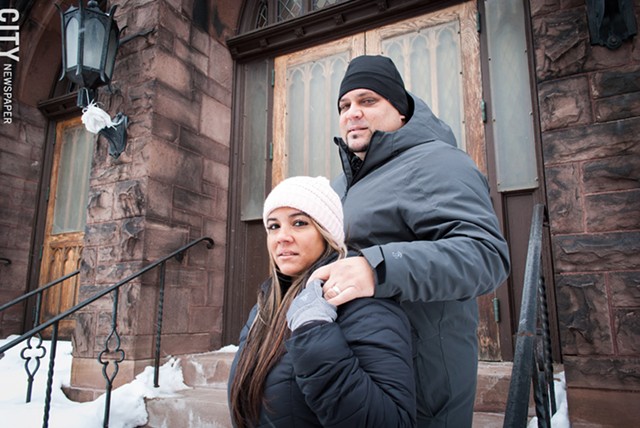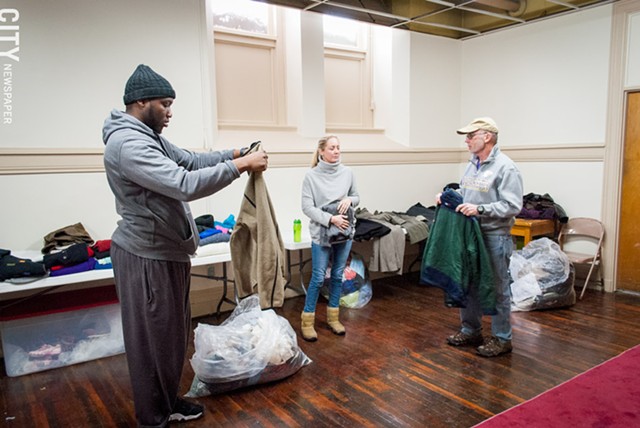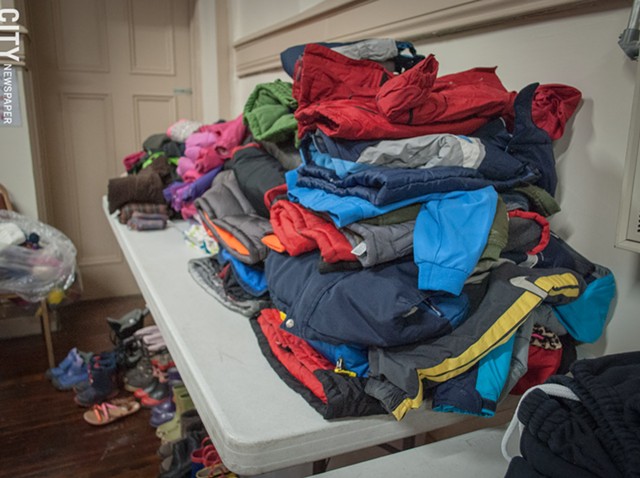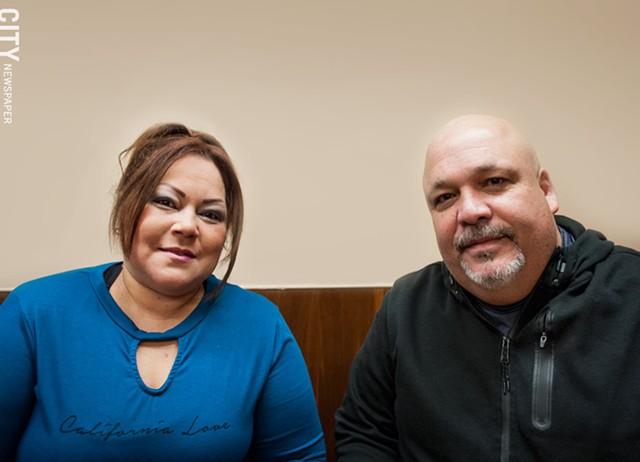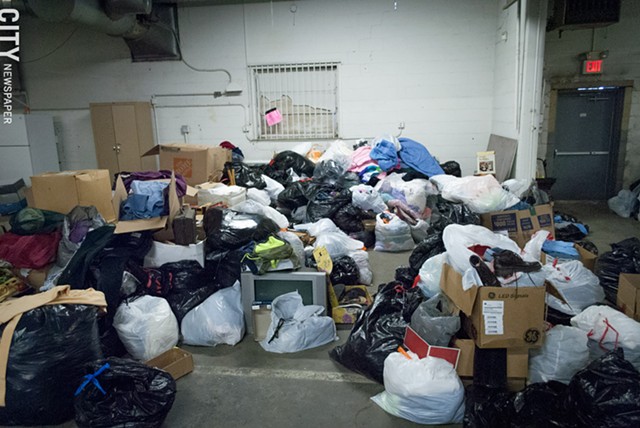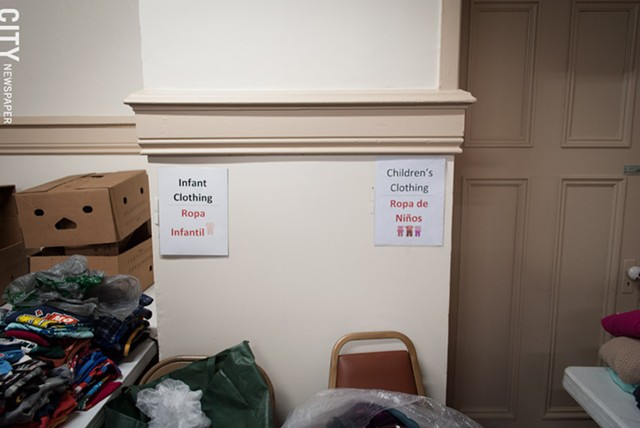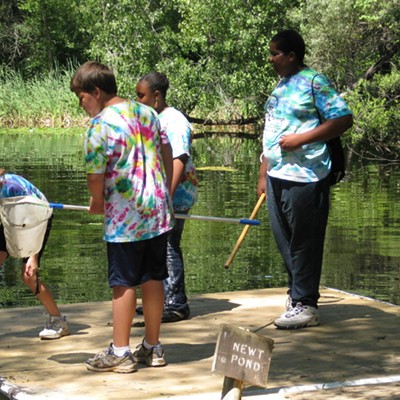
[
{
"name": "500x250 Ad",
"insertPoint": "5",
"component": "15667920",
"parentWrapperClass": "",
"requiredCountToDisplay": "1"
}
]
The Ibero American Action League opened the doors to its resource center for Hurricane Maria victims at 10 a.m. on Thursday, November 9. It hadn't snowed more than a few flurries, but it was a damp-and-cold, Rochester gray morning. Nonetheless, people had been lining up since near dawn outside the vacant brick school building on Clifford Avenue that Ibero is using.
More than 1,000 people flowed through the center that day: young people, families with children, seniors, some with mobility and health concerns. Some people were wearing light summer clothing. An elderly woman, assisted by others, arrived looking confused and upset, tears rolling down her face.
Among the volunteers on hand to help was recently retired Rochester school board member José Cruz. A planning specialist for Lifespan, Cruz has worked with many people going through hard times. But he was stunned by what he saw that day.
"I've never seen so many people looking shell-shocked," he said afterward. "They looked like they were beyond being scared. Numb. I'll never forget it."
In the weeks after Hurricane Maria roared across Puerto Rico, more than 160,000 residents fled the devastated island, according to the New York Times. Although tens of thousands of them went to Florida, many have found their way to Rochester, which has the state's second largest Hispanic population.
As the migration built, Ibero organized the resource center as a one-stop site, so that education, health, and human service organizations could help people with resettlement. More than a dozen agencies and organizations, from every corner of Monroe County, set up shop – the Red Cross, the Rochester school district, the Rochester Housing Authority, Rochester Works, Rochester Regional Health, Catholic Family Center, Food Link....
No one, including officials at Ibero, had imagined that so many people would need help. Ibero was so swamped during the first days the center was open that sometimes they had to limit entry to 20 people at a time.
"Some people have been in Rochester for a few weeks already," Ibero spokesperson Patricia Cruz-Irving, said that afternoon, "and others are just arriving and coming here with a friend or relative."
Among the new arrivals was Miguel Diaz Ledée.
"I had to come here for two reasons," he said. "I lost everything, but I'm also on a medical list for a liver transplant, and the hospitals are not functional on the island. I didn't really want to come here, but I had no choice."
Ledée, who is living temporarily with a family member, has been through other storms in Puerto Rico. "I was 10 years old when George came through," he said, "but there's never been anything like this. Maria was a monster to us. She took everything."
Ibero staff member Ida Perez and her small army of cooks and servers, mostly Latina women, stood behind a counter serving food as people milled about drinking coffee and eating from paper plates.
Perez is a grandmotherly woman who has served a lot of rice and beans in her day, but she hadn't experienced anything like what had happened when she handed a plateful to an elderly man earlier that afternoon.
Overwhelmed by the offer of Puerto Rican-style rice and beans, the man had begun to cry. "He hadn't had any home-cooked food like this in the month that he's been here," Perez said, "and he said the taste and the smells made him homesick."
"We tried to offer him more," she said, "but he refused it, because he said he wanted there to be enough for others."
"It's heartbreaking that such a simple thing can mean so much," Perez said.
The resource center – now relocated to Our Lady of the Americas church on East Main Street – has been open almost every Thursday for more than two months now.
Hilda Rosario Escher, Ibero's president and CEO, is usually at the center with about a dozen other Ibero staff members and volunteers, taking down names and contact information as people enter the building.
Most of the people coming to the center say they didn't want to leave Puerto Rico, Escher said one afternoon as people continued to arrive at the center.
"They're leaving their homes, and in many cases their families, behind," Escher said. "It's so upsetting. Puerto Rico is home to them. They show me these pictures of a house and it has no roof, trees that are stripped bare, and there's rubble everywhere. But they realize that there's nothing there for them anymore, so now they have to make a new home for themselves here in Rochester."
For most of the newcomers, finding housing is the biggest worry, and the line is usually longest at the Rochester Housing Authority table, where staff is helping people get Section 8 vouchers.
RHA has a long waiting list of people seeking affordable housing. But given the urgency for people coming from Puerto Rico, officials at RHA have been working with FEMA to eliminate any waiting time or other obstacles.
"They have to register and get on the waiting list, but they have priority," said Hemily Sotomayor, a RHA housing specialist helping at the center. (And yes, she's related to the Supreme Court Justice).
Once the newcomers receive their voucher, they still have to find a suitable property that they can afford. And it has to be inspected before they can move in, said Sotomayor.
"It's overwhelming at times, seeing children and seniors worrying about whether they will have a roof over their head tonight," Sotomayor said. "And you can't always give them an answer right then and there, which is frustrating. But you do your best to reassure them."
Many people coming from Puerto Rico have a family member or a close friend that they can stay with for a while. But some landlords don't want extra people living in an apartment for a month or two, so there's pressure to find an apartment as quickly as possible.
From the day the resource center opened in early November, enrolling children in school has been a big priority for many of the new immigrants. The Rochester school district has enrolled 500 children from Puerto Rico during the last two months, and is prepared to enroll as many as 1,000.
But the enrollment process can be complicated. Some children speak English fluently, some can speak a little English, and others speak only Spanish. The new students' language skills and academic level have to be evaluated so they can be placed in schools with programs that meet their needs, said Elizabeth Reyes, RSCD's associate director for families in transition.
"We also have to coordinate transportation, so the housing component is important," Reyes said. "And we have to coordinate food service. And we want to make sure that they have everything they need to start school. We say 'no' to no one."
Luis Baez, who was at the center on November 9 and the following Thursday, said his four children – ages 5, 6, 8, and 12 – had already been registered for school.
"I didn't know what to expect," he said, "but it's gone smoothly. They'll all be going to School 9, which is good. This way, they'll be together. It's a big adjustment, but this makes me feel like we're making progress, and we will get through this."
Another big adjustment for many of the newcomers: Rochester's winter weather. While some have relatives in Rochester and were familiar with its climate, they're coming from Puerto Rico's subtropical climate and have little in the way of winter clothing. On the Saturday morning before Thanksgiving, Ibero hosted a coat giveaway in the former school building it's using, and the building's gymnasium was filled with donations.
Men's, women's, and children's jackets and coats, every style and size, were piled on tables – 4 and 5 feet high in some spots. Hundreds of people dug through them, holding them up, trying them on.
"This is my first winter jacket, and it's never been worn," said a woman showing off a navy Tommy Hilfiger jacket, still bearing its tags. "My husband is going to be sorry he didn't come. He never likes what I pick out for him, so, too bad."
People were walking out with their arms full, and it wasn't long before the piles had been reduced to a few stacks.
The coat drive is just one example of the support that the Rochester community has showed. Right after the hurricane, local residents Millie Markajani and her husband Don had sent 2,000 pounds of goods to the island: batteries, bottled water, hand sanitizer, cereal, canned foods – anything they could think of that could be shipped and wouldn't spoil from the extreme heat.
"I have family there, and when the hurricane hit we started sending lots of things," Millie Markajani said during an interview at the Ibero office in December. "They need everything."
Markajani, who owns a Curves gym in Penfield, organized an angel tree there. With the help of Ibero's staff, she contacted families, got children's names, found out children's favorite toys and clothing sizes. She and many of her Curve members bought gifts and wrapped them, and shortly before Christmas, they held a gift give-away at Ibero's East Main Street office, stacking a community recreation room from floor to ceiling with gift packages – sorted alphabetically – for more than 60 children.
Community support like that "is not me and my doing, and it's not Ibero's," said Hilda Rosario Escher. "This has been a collaborative effort. I am so grateful to this community for making donations of everything from coats to strollers to car seats."
"There's no way we could do all of this alone," she said. "The need is too great."
Escher has called people in the community nearly every day since the resource center opened in November: "Can you help with beds or furniture or this or that?"
"And do you know," she said, "not one person has said no to me."
Escher also keeps tabs on some of the newcomers who need extra help.
"On Christmas Day and throughout the holidays," she said, "I called people just to check on them and to let them know: I'm here, you're not alone, and everything will be all right. I've even kept tabs on the kids in school. The schools have been wonderful. In some cases, they've paired the new kids with a peer or buddy. Everyone has been very sensitive about what they've been through."
Still, every day there are people who need immediate help, because for them, things aren't going well. Last month, for instance, one family managed to find an apartment, but it was infested with rodents. Escher had to help the family find a new apartment and come up with another deposit.
Escher has also been working to keep Sully Ruiz, a single mother, from becoming homeless. Ruiz, who has three children – 8-year-old twin boys and an infant – lost her home in the storm. She's been in Rochester for more than a month, and at first she was able to stay with a friend. But the friend asked her to leave to avoid problems with her landlord.
Since then, she's been living in a motel room with her children and she has limited funds, she said recently. Desperate for help, she walked with her children all the way from Lyell Avenue to Ibero's East Main Street office during the recent cold snap.
"My biggest worry is finding a place for me and my children to live," she said. "We only have until February 10. After that, I don't know what I'll do."
Escher has been working with RHA to help Ruiz find another place to live. "Sometimes you have to pull every string and bend every rule to help someone," she said. "But we'll make it work."
Julio Velez and Betsy Bermudez are further along than Ruiz at resettling in Rochester. They've found an apartment and no longer have to live in a relative's cramped attic. During a recent interview at Ibero's radio station, Velez talked about the life they left behind in Puerto Rico after Maria destroyed their home.
The couple ran an entertainment business, staging special events for birthdays, weddings, and other occasions, and they had lived a comfortable life, Velez said, until their business started to slow. They'd been thinking of moving to the US mainland at some point, and Velez was in Rochester searching for steady employment when Maria struck.
But Bermudez was at home in Puerto Rico with their youngest daughter.
"The hurricane comes with so much force, I can't believe it," Bermudez said. "I'm there and I have no money, no groceries, no electricity, no food, and no water. Banks are closed. Gas stations are closed. Nothing works, and there's nothing I can do."
"It was terrible to go outside and see all of that destruction," she said. "To see everything we had, everything we worked so hard for, destroyed like that: It was a horror."
And phones, including cellphones, weren't working.
"I was desperate," Velez said, "because for two weeks, we had no communication, and I didn't know what happened to them. I'm dying. Every day and night I'm wondering: Where are they? Are they OK? Has something happened to them?"
The area where their house is located still doesn't have electricity or water, Velez said, and there's no indication of when services will return.
Velez and Bermudez are also concerned about their daughter, who's going to Monroe High School.
"In Puerto Rico, she was a 4.0 GPA, but now it's very difficult for her," Velez said. They had a momentary scare recently when she didn't get home from school on time. She had gotten on the wrong bus.
"She ended up in Henrietta," Velez said, "but she couldn't tell us how to get to her, because she didn't know where she was. Other kids who have just come here have done the same thing."
Bermudez has mixed feelings about being in Rochester. She misses Puerto Rico, but she also likes the fact that everyday grocery items like milk and eggs are cheaper here.
"Almost everything is shipped into Puerto Rico," she said, "so everything there is more expensive."
Velez is working almost around the clock doing a variety of jobs. "Every hour I can work, I do it," he said. "I don't care what it is. I just want the work."
And Bermudez is trying to find work. "I want to get a job to take some of the burden off of him," she said. "I don't want to be a burden on him."
Bermudez applied for SNAP benefits, but was told that she needed to apply for several jobs every day to qualify.
"I explained to them I don't have a computer, and I don't have any transportation," she said.
But Velez is optimistic. Things are getting better, he said.
"It's a transition, but we have to do it," he said. "We've found an apartment. God has delivered to us, and we are very thankful. We have a lot to be grateful for."
For Neysha Fonseca, who came here with her 8-year-old son Caleb, the move was bittersweet.
"I love Puerto Rico," she said during a recent interview at the resource center, "and I miss the sunshine and the beaches."
Christmas was particularly hard. "Christmas in Puerto Rico is so wonderful," Fonseca said. "It's a big celebration. And I missed my mother and my sister. I come from a big, big family, and we are very close."
But Caleb, who is already in school, likes it here, she said. Some children keep asking when they will be going home, but Caleb has already settled in and doesn't want to go back. He loves baseball, a favorite pastime in Puerto Rico, and he has already signed up to play in a Little League team next summer.
"I saw this move as an opportunity for him," she said. "I wanted him to have a better economic future, a better quality of life than he might have in Puerto Rico."
Fonseca had gone through Hurricanes Hugo and George, but when Maria hit Puerto Rico, she thought maybe it was time for a change.
"I prayed for a sign," she said. "'Lord, give me a sign of what to do.' My cousin is here, and she said, Come here right now. And I thought, 'OK, a door just opened.'"
Fonseca can speak English pretty well, and she already works part-time in a beauty salon and is going to cosmetology school. But as with some of the other newcomers, relocation is interrupting family life.
Fonseca's husband, Jaime Diaz, stayed behind in Puerto Rico through Christmas. The couple used FaceTime to talk to each other, she said, but it wasn't easy.
Diaz came here recently to look for work, and the couple moved into a new home, a roomy apartment off Culver Road in Irondequoit. The apartment has an eat-in kitchen, patio, and a good-sized back yard. But there are still challenges: After a short family outing to see Niagara Falls, Diaz had to return to Puerto Rico until he can find permanent work in Rochester. It's a familiar situation for many families: A spouse comes here, gets a job, saves some money, then sends for another member of the family, until eventually everyone is reunited. But that can take months, even years.
Ibero's Escher says the agency has never undertaken anything like the relocation efforts that have been underway since late October. And she doesn't know of any other agency in the area that has received so many people at one time. It has pushed her small staff and volunteers to the limit, she said.
"They tell me, 'We have families, too, that we need to take care of," she said. "This was something new to all of us. I tell them, 'We have to do this. Look what they're going through.' And most of them understand. I'm very proud of that."
Escher is effusive describing how Ibero and all of the other agencies and non-profits have pulled together to help. "The local community, I can't say enough about it," she said. "People say we can't work together. That's not true. This is proof we can."
But she's very critical of the federal government's response.
"I'm very disappointed in the federal government," she said. "They should have allocated funds directly to the agencies. We are doing the work."
The federal government has also been slow in its emergency response to Puerto Rico, she said.
"I know, because I've been there, and I've seen it for myself," Escher said. "Much of the island is still without electricity. I still can't communicate with my sister. And families are still drinking from creeks where the water is contaminated. This happened in September, and it's now January. Do you think the people in Texas and Florida would stand for this?"
She and many others in Rochester's Puerto Rican community and on the island think that the current political atmosphere hasn't helped matters, she said.
"Puerto Ricans are US citizens," she said. "It is not some Third World country. But sometimes it feels like we treat it like a colony."
The slow progress at repairing Puerto Rico has fueled at least of some of the outmigration from the island, and that is straining resources here, Escher said. And even unrelated problems can add to the strain. During the recent cold snap, the pipes burst in Ibero's building on Clifford Avenue, forcing the resource center to move.
"We had to close for a couple of weeks until we could find a new location," Escher said, "because the people, they are still coming."
Representatives from Ibero and the other agencies met last week to discuss whether they needed to continue operating the resource center. The decision: keep it open. The need is still there.
Julio Saenz, manager of Ibero's Latin radio station, WEPL 97.1 FM, helped with the translation in many of the interviews in this article.
Speaking of...
-

Urban Action 5/2
May 2, 2018 -
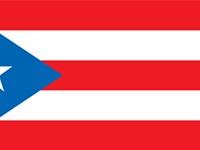
Calamity in Puerto Rico has families worried here
Jan 13, 2016 -

Latino Rochester: pride and power
Apr 10, 2013 - More »
Latest in News
More by Tim Louis Macaluso
-

RCSD financial crisis builds
Sep 23, 2019 -

RCSD facing spending concerns
Sep 20, 2019 -

Education forum tomorrow night for downtown residents
Sep 17, 2019 - More »
